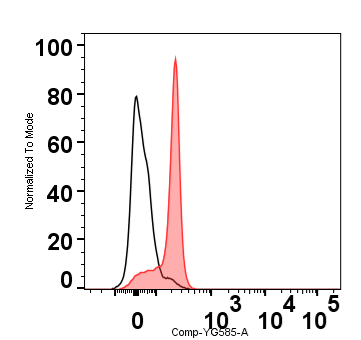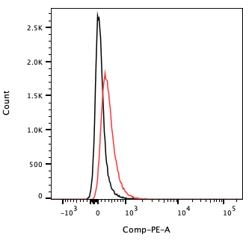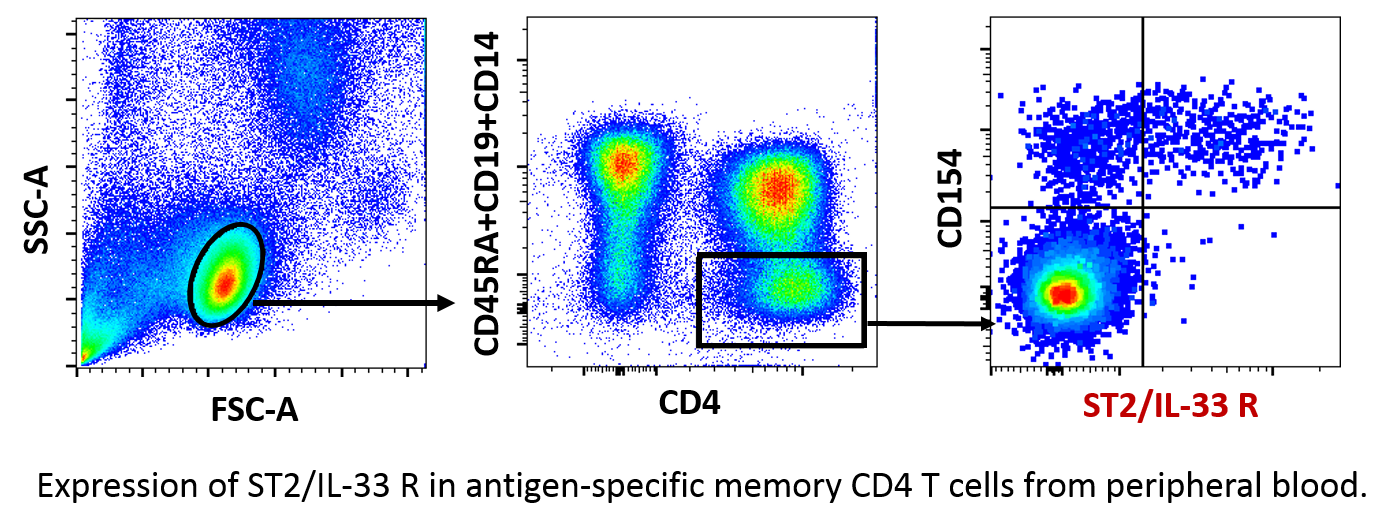Human ST2/IL-33R PE-conjugated Antibody Summary
Lys19-Phe328
Accession # BAA02233
Applications
Please Note: Optimal dilutions should be determined by each laboratory for each application. General Protocols are available in the Technical Information section on our website.
Scientific Data
 View Larger
View Larger
Detection of ST2/IL‑33 R4 in HUVEC Human Cells by Flow Cytometry. HUVEC human umbilical vein endothelial cells were stained with Goat Anti-Human ST2/IL-33 R PE-conjugated Polyclonal Antibody (Catalog # FAB5231P, filled histogram) or isotype control antibody (IC108P, open histogram). Staining was performed using our Staining Membrane-associated Proteins protocol.
 View Larger
View Larger
Detection of ST2/IL‑33 R4 in KG‑1a Human Cell Line by Flow Cytometry. KG-1a human acute myelogenous leukemia cell line was stained with Goat Anti-Human ST2/IL-33 R PE-conjugated Polyclonal Antibody (Catalog # FAB5231P, filled histogram) or isotype control antibody (Catalog # IC108P, open histogram). View our protocol for Staining Membrane-associated Proteins.
 View Larger
View Larger
Detection of Human ST2/IL-33R by Flow Cytometry Intrahepatic human ILC2 display a tissue resident phenotype, express CD161 and PGD2 is present in human inflamed livers.(A) The CD45pos CD3neg lineageneg CD127pos CRTH2pos ILC2 subset was gated and CD161 and CD69 expressions were analysed. CD161 and CD69 representative overlays and summary data are shown. (B) PGD2 production by human liver. The secretion of PGD2 by normal and inflamed human liver tissue was analysed by ELISA on 24-hour liver tissue supernatants prepared for 1g-tissue/1ml culture medium. Summary data are median ± Interquartile range. (C) Expression of the IL-33 receptor, ST2 was analysed on ILC2. Representative overlay and summary data are shown. In histogram overlays, dotted lines are isotype staining and shaded histograms marker expression. Image collected and cropped by CiteAb from the following publication (https://pubmed.ncbi.nlm.nih.gov/29261670), licensed under a CC-BY license. Not internally tested by R&D Systems.
Reconstitution Calculator
Preparation and Storage
- 12 months from date of receipt, 2 to 8 °C as supplied.
Background: ST2/IL-33R
ST2, also known as IL-33R, IL-1 R4 and T1, is an Interleukin-1 receptor family glycoprotein that contributes to Th2 immune responses (1, 2). Human ST2 consists of a 310 amino acid (aa) extracellular domain (ECD) with three Ig-like domains, a 21 aa transmembrane segment, and a 207 aa cytoplasmic domain with an intracellular TIR domain (3, 4). Alternate splicing of the 120 kDa human ST2 generates a soluble 60 kDa isoform that lacks the transmembrane and cytoplasmic regions as well as an isoform that additionally lacks the third Ig‑like domain (4). Within the ECD, human ST2 shares 68% and 64% aa sequence identity with mouse and rat ST2, respectively. ST2 is expressed on the surface of mast cells, activated Th2 cells, macrophages, and cardiac myocytes (5‑8). It binds IL-33, a cytokine that is upregulated by inflammation or mechanical strain in smooth muscle cells, airway epithelia, keratinocytes, and cardiac fibroblasts (5, 9). IL-33 binding induces the association of ST2 with IL-1R AcP, a shared signaling subunit that also associates with IL-1 RI and IL-1 R rp2 (1, 10, 11). In macrophages, ST2 interferes with signaling from IL-1 RI and TLR4 by sequestering the adaptor proteins MyD88 and Mal (7). In addition to its role in promoting mast cell and Th2 dependent inflammation, ST2 activation enhances antigen induced hypernociception and protects from atherosclerosis and cardiac hypertrophy (5, 12‑14). The soluble ST2 isoform is released by activated Th2 cells and strained cardiac myocytes and is elevated in the serum in allergic asthma (6, 8, 15). Soluble ST2 functions as a decoy receptor that blocks IL‑33's ability to signal through transmembrane ST2 (10, 13‑15).
-
Barksby, H.E. et al. (2007) Clin. Exp. Immunol. 149:217.
-
Gadina, M. and C.A. Jefferies (2007) Science STKE 2007:pe31.
-
Tominaga, S. et al. (1992) Biochim. Biophys. Acta 1171:215.
-
Li, H. et al. (2000) Genomics 67:284.
-
Schmitz, J. et al. (2005) Immunity 23:479.
-
Lecart, S. et al. (2002) Eur. J. Immunol. 32:2979.
-
Brint, E.K. et al. (2004) Nat. Immunol. 5:373.
-
Weinberg, E.O. et al. (2002) Circulation 106:2961.
-
Sanada S. et al. (2007) J. Clin. Invest. 117:1538.
-
Palmer, G. et al. (2008) Cytokine 42:358.
-
Chackerian, A.A. et al. (2007) J. Immunol. 179:2551.
-
Allakhverdi, Z. et al. (2007) J. Immunol. 179:2051.
-
Verri Jr., W.A. et al. (2008) Proc. Natl. Acad. Sci. 105:2723.
-
Miller, A.M. et al. (2008) J. Exp. Med. 205:339.
-
Hayakawa, H. et al. (2007) J. Biol. Chem. 282:26369.
Product Datasheets
Citations for Human ST2/IL-33R PE-conjugated Antibody
R&D Systems personnel manually curate a database that contains references using R&D Systems products. The data collected includes not only links to publications in PubMed, but also provides information about sample types, species, and experimental conditions.
6
Citations: Showing 1 - 6
Filter your results:
Filter by:
-
Organoids capture tissue-specific innate lymphoid cell development in mice and humans
Authors: GM Jowett, E Read, LB Roberts, D Coman, M Vilà Gonzá, T Zabinski, U Niazi, R Reis, TJ Trieu, D Danovi, E Gentleman, L Vallier, MA Curtis, GM Lord, JF Neves
Cell Reports, 2022-08-30;40(9):111281.
Species: Human
Sample Types: Whole Cells
Applications: Flow Cytometry -
Interleukin-33 activates group 2 innate lymphoid cell expansion and modulates endometriosis
Authors: JE Miller, H Lingegowda, LK Symons, O Bougie, SL Young, BA Lessey, M Koti, C Tayade
JCI Insight, 2021-12-08;0(0):.
Species: Human
Sample Types: Whole Cells
Applications: Flow Cytometry -
Acid Stripping of Surface IgE Antibodies Bound to Fc&epsilonRI is Unsuitable for the Functional Assays that Require Long-Term Culture of Basophils and Entire Removal of Surface IgE
Authors: C Galeotti, A Karnam, M Das, SV Kaveri, J Bayry
Int J Mol Sci, 2020-01-13;21(2):.
Species: Human
Sample Types: Whole Cells
Applications: Flow Cytometry -
Hallmarks of primate lentiviral immunodeficiency infection recapitulate loss of innate lymphoid cells
Authors: JC Mudd, K Busman-Sah, SR DiNapoli, S Lai, V Sheik, A Lisco, C Deleage, B Richardson, DJ Palesch, M Paiardini, M Cameron, I Sereti, RK Reeves, JD Estes, JM Brenchley
Nat Commun, 2018-09-27;9(1):3967.
Species: Primate - Macaca mulatta (Rhesus Macaque)
Sample Types: Whole Cells
Applications: Flow Cytometry -
SP and IL-33 together markedly enhance TNF synthesis and secretion from human mast cells mediated by the interaction of their receptors
Authors: A Taracanova, M Alevizos, A Karagkouni, Z Weng, E Norwitz, P Conti, SE Leeman, TC Theoharide
Proc. Natl. Acad. Sci. U.S.A., 2017-05-01;0(0):.
Species: Human
Sample Types: Whole Cells
Applications: Flow Cytometry -
BCR-ABL-induced deregulation of the IL-33/ST2 pathway in CD34+ progenitors from chronic myeloid leukemia patients.
Authors: Levescot A, Flamant S, Basbous S, Jacomet F, Feraud O, Anne Bourgeois E, Bonnet M, Giraud C, Roy L, Barra A, Chomel J, Turhan A, Guilhot F, Girard J, Gombert J, Herbelin A
Cancer Res, 2014-03-27;74(10):2669-76.
Species: Human
Sample Types: Whole Cells
Applications: Flow Cytometry
FAQs
No product specific FAQs exist for this product, however you may
View all Antibody FAQsReviews for Human ST2/IL-33R PE-conjugated Antibody
Average Rating: 5 (Based on 3 Reviews)
Have you used Human ST2/IL-33R PE-conjugated Antibody?
Submit a review and receive an Amazon gift card.
$25/€18/£15/$25CAN/¥75 Yuan/¥2500 Yen for a review with an image
$10/€7/£6/$10 CAD/¥70 Yuan/¥1110 Yen for a review without an image
Filter by:







